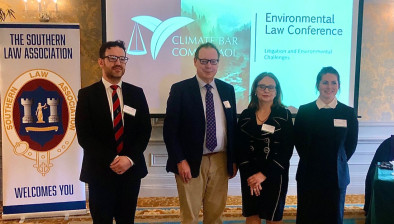NI High Court: Court rejects all grounds of challenge against 1,350-metre-deep natural gas project off the Antrim coast

Northern Ireland’s High Court has dismissed all grounds challenging a deep-sea gas cavern development project off the coast of Co Antrim. The court found that the decision to grant the marine license to the developers was a rational one, backed up by scientific evidence.

About this case:
- Citation:[2023] NIKB 84
- Judgment:
- Court:NI High Court
- Judge:Mr Justice Michael Humphreys
Delivering the judgment, Mr Justice Michael Humphreys noted that it was necessary for the applicants to show that the decision under review was irrational, not merely that there was a disagreement of scientific opinion.
Background
This was an application for judicial review concerning the proposed development of seven natural gas storage caverns off the coast of Co Antrim. The applicants were limited companies, the first formed by local residents opposed to the development and the second established by an environmental campaigner.
The applicants sought to impugn three decisions by the respondent, the Department for Agriculture, Environment and Rural Affairs (DAERA) in 2021, including the granting of a license for marine construction to the developer, Islandmagee Energy Limited (IMEL).
Creation of the gas caverns, formed 1,350 metres below sea level, will be by a process known as solution mining. This creates cavities in the salt layer by pumping seawater and causing it to dissolve. The project is expected to last for 40 years.
Public consultation in December 2019 received objections from both applicants, as well as various political parties and representatives and the Northern Ireland Marine Taskforce.
However, in 2021, a Habitats Regulations Assessment concluded that there would be no adverse effects on the integrity of any designated site. In September 2021 an email indicated that the minister decided to approve the project.
The grounds of challenge
The applicants’ skeleton argument identified seven grounds of challenge. These largely focused on claims of breaches of relevant legislation and regulations. They also argued that the applications should have been referred to the Executive Committee, and that irrelevant considerations were taken into account relating to a proposed community fund.
They further claimed that the impact on scallops, skate, and other living organisms in the region was not taken into account, and that the decision maker did not assess the environmental impact involved in decommissioning the project.
Consideration
Ground 1: Failure to refer to the executive committee
First, the court noted that the fact that the ultimate decision was taken by the minister could not, of itself, require referral to the Executive. Here, his decision not to refer was merely an “exercise of evaluative judgement with which the courts will be slow to interfere”.
Ground 2: The taking into account of an irrelevant consideration, namely the community fund
Next the court considered the ‘immaterial consideration’ of the ‘community fund’ proposed by IMEL. This was a proposed trust that would include representatives from the local area. It would support local projects relating to education, geology and the environment, with an initial investment of £1 million.
Claire Vincent, principal scientific officer in DAERA, argued that the fund was not, in fact, taken into account in the decision to grant the marine licence. She noted that it was not made a condition of the licence, unlike other proper mitigation measures.
The court accepted this, noting that while a reference to the proposal ought not to have featured in the submission, it was not treated as a material consideration.
Ground 4: The failure to take into account material considerations, namely the impact on scallops and skate
The court then considered the arguments raised regarding the impact on local sea life. In relation to the impact on scallops and the scallop fishing industry, Ms Vincent noted that the impacted area was extremely small and, scallops being a mobile species, would not suffer any significant detrimental effect.
An environmental statement concluded that the common skate is severely depleted in Northern Ireland waters, but found that the brine discharge would not significantly impact on it. Accordingly, conditions were imposed in the marine licence on the nature and extent of the brine discharge in order to mitigate any risk of harm.
The material before the decision maker did reference shellfish and the impact on the local fishing industry generally, without specifically mentioning scallops. However, the court noted that submissions of this nature do not need to descend into every detail, per R (Christian Concern) v Secretary of State for Health and Social Care [2020] EWHC 1546.
This ground of challenge therefore failed.
Ground 5: Breach of the Habitats Regulations
The applicants made criticisms relating to the quality of bird survey data produced by IMEL and assessed by the respondent, claiming that these breached Regulation 43 of the Conservation (Natural Habitats, etc.) Regulations (Northern Ireland) 1995. The applicants argued that they were not carried out at an appropriate time of year, and that previous surveys were out of date.
DAREA concluded that it had sufficient data to consider the likely significant effects of the project on bird species, relying on the advice of ornithologists within the Northern Ireland Environment Agency.
The court described this as “classic Wednesbury territory”, noting that it was for the applicants to show that the decision was irrational, not merely that a body of scientific opinion disagreed with the Department’s conclusions.
Relying on the evidence before it, it was for the Department to determine the adequacy of the information provided. The claim of breach of regulation 43 of the Habitats Regulations was therefore dismissed.
Ground 6: The failure to assess the environmental impact of decommissioning
Finally, the applicants argued that DAERA engaged in unlawful ‘project splitting’ by separating the construction and operation of the project from potential issues and impacts arising from its decommissioning.
They noted that decommissioning of the caverns is an inevitable part of the project, and, therefore, the environmental impacts of this process must also be assessed under the Marine Works (Environmental Impact Assessment) Regulations 2007.
The court again rejected this argument. The judge highlighted that, based on the evidence available, the decommissioning process had been assessed. Further, the court accepted that the relevant legislation and standards may be different in 40 years’ time, when the decommissioning will likely occur.
The court determined: “It would itself be irrational to seek to prescribe a detailed method by which the caverns ought to be decommissioned decades before the work would be carried out.”
Conclusion
Ultimately, the court rejected all of the grounds put forward, and the application for judicial review was dismissed.












